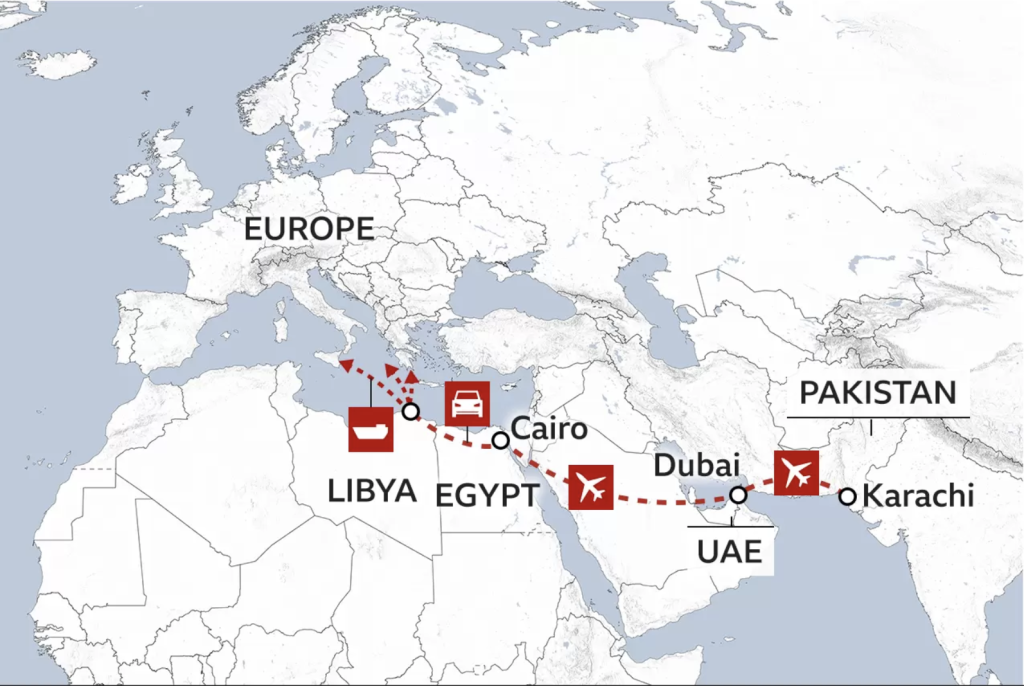Numerous Pakistanis are travelling through Libya in search of employment in Europe. It includes travelling by boat, whose dangers were brought to light in June when an overcrowded ship capsized off the coast of Greece, killing a significant number of people. The majority of the almost 13,000 Pakistanis who travelled to Libya and Egypt this year have not been heard from again, including two teens whose final words to their mother were “don’t worry.”
In Punjab province, it is 35°C (95°F), humid, and still there. Our backs begin to perspire, and the officer’s temple begins to shine.
We are escorted to a small cell after walking through rooms loaded with precariously balanced paper stacks down a short, open corridor. A solitary fan whirls behind the cell bars as sixteen guys sit side by side on the cement floor, wetness seeps through the walls, and there is just one toilet behind a low wall.
All of these individuals are suspected of being involved in human smuggling, with the majority having a direct connection to the migrant ship that departed from Libya and capsized off the coast of Greece on June 14. Nearly 300 Pakistanis who were believed to be on board are presumed dead and missing.
If anyone would like to speak, we ask. Most people divert their gaze, but Husnain Shah stands up. He claims to have been a smuggler for more than ten years; nevertheless, he denies having played a significant part in the shipwreck off the coast of Greece. This is his third arrest.
People visit our homes and ask us to put them in touch with someone who can send their brothers and sons abroad since there is so much unemployment here, he claims. In his years of operation, he figures he has abducted thousands of people.
Because there was no other business, I started this. I don’t play a major part; instead, the big and wealthy people in Libya receive the majority of the funds—not even a tenth of it.
His tone changes when I inquire about whether he harbours remorse for what happened to people who passed while using these methods.
“I felt terrible, we should be so embarrassed. What can we do, though? Someone else will complete this if I don’t.

Many people in this country are considering moving abroad since even a poor wage will likely be higher there than they can make here, where the economy is teetering on the brink, inflation has reached about 40%, and the Pakistani rupee is losing value.
At the conclusion of the previous year, a poll indicated that 62% of boys and young men between the ages of 15 and 24 desired to leave. While some will attempt to do things lawfully, others will seek out other options.
Illegal immigration is difficult to measure by nature, but the Pakistani authorities informed us that the recent Greek disaster had highlighted a newly popular path for Pakistanis, which involved flying via Dubai to Egypt or Libya before taking a large boat from eastern Libya to Europe.
According to Mohammed Alam Shinwari, who is in charge of Pakistan’s probe into what transpired with the Greek shipwreck, Pakistan now has fewer deportees from other routes, such as over Iran, as fewer individuals are making the journeys as countries like Turkey tightened down on illegal immigration.
He revealed to BBC In the first half of 2023, approximately 13,000 passengers travelled from Pakistan to Libya or Egypt, compared to only 7,000 in all of 2022. 10,000 of those 13,000 have not come back.
We are unsure of their whereabouts, whether they are still in Libya or have left for one of the European nations.
It is astonishing that the police didn’t realise how many Pakistanis were using this route before the shipwreck. Pakistanis were aboard a ship in February that sank off the coast of Italy after sailing from Turkey via Libya.
However, Mr. Shinwari says that it makes it difficult to investigate these pathways when families choose not to inform the police of what has occurred.
People don’t file complaints, he claims, preferring to settle disputes outside of court. Since the families are the ones who must provide the information, they frequently refuse to do so, it becomes quite challenging for us to investigate these instances and obtain the necessary data.
Additionally, many of these visitors, according to him, travelled on legal papers with valid visas for Dubai or Egypt, making it challenging to stop them. The fact that the trip costs between 2.5 and 3 million rupees (£6,780 to 8,140; $8,725 to 10,470) more than prior routes again demonstrates how much people are willing to spend to leave.
Pakistan makes efforts to halt illegal immigration; according to Mr. Shinwari, they prevented 19,000 people from leaving the country last year out of concern that they would become targets of people smuggling and had 20,000 Pakistanis returned back.
“As to how many people are going,” he replies. “We have no idea,” was said.
Some of the travellers are currently stranded in Libya. We stop in a village in Punjab to talk to one family, but soon guys from all throughout the neighbourhood join us.
They sent some of their young guys to Libya a few weeks prior, and they are still there. They plead for additional money through voice messages and videos that they send to family and friends.
A parent shows us a video of over 100 men gathered in a room without windows and with white walls and floors. To survive the heat, the majority of the men are only wearing their pants, and others are pleading with the camera to let them out.
Their relatives are in the dark as to whether they are still being held by traffickers, by Libyan officials, or by someone else due to the confusion in the situation. They requested that we keep their identities a secret in case the men currently being held face reprisals.
One father informs me, “They only feed them once every two to three days.” “My 18-year-old son frequently cries. What type of difficulty have we gotten into, he asks, “We gave the money and we’re here dying.”
The families’ desires for the future are inconsistent even in light of these circumstances. When questioned, they at first replied that they wanted a safe route for the young men to travel on to Europe, but subsequently added that they wanted them to go back home.
Police claim that the foreign affairs ministry of Pakistan is aware of this and is addressing it.
We spoke to many individuals across Pakistan who stated they were actively looking to travel illegally despite the dangers and the police onslaught.
A smuggler residing in Europe claimed that routes continued to leave Pakistan. Even the police officials admitted that they are aware of continued illegal immigration and departures from the nation.
Everyone we met with who had either sent their boys voluntarily or who had shown a desire to leave spoke of hoping for a better life.
Some discussed peer pressure; one man claimed that because most of his brothers and cousins had already crossed, he was now pressured to justify his decision to stay at social gatherings.
Others spoke of seeing the homes constructed with funds acquired abroad and of being under pressure from the local smugglers to make the right decision for their children’s future.
Some even have firsthand knowledge from having travelled on their own.
By Nishtha Dhoundiyal














